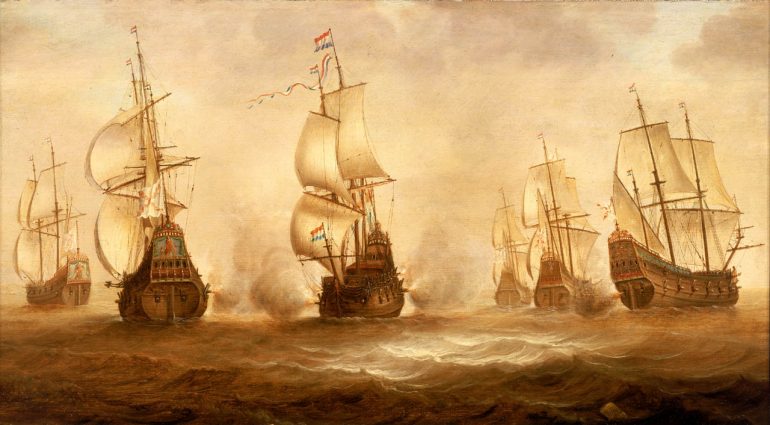We’ve noted before that the small communities of Torbay were plagued by pirates from North Africa. Another maritime threat came from the Dunkirkers or Dunkirk Privateers. These were raiders who operated in the English Channel during the Dutch Revolt (1568–1648). This was when the northern, Protestant Seven Provinces of the Low Countries rebelled against the rule of the Catholic Habsburg King Philip of Spain.
The Dunkirkers were what were known as commerce raiders, and attacked merchant shipping and fishing vessels to disrupt trade, rather than getting involved in engaging other warships. They were in the service of the Spanish monarchy and part of the Spanish Flemish fleet (Armada de Flandes). They operated from the ports of Nieuwpoort, Ostend and Dunkirk and at first sailed a group of warships outfitted by the Spanish government. Later, as plundering largely unarmed vessels was so easy and lucrative, non-government investment led to a larger fleet of privately owned and outfitted privateering warships. At their peak, the Dunkirkers operated about a hundred ships, the crews being mostly Flemish and Walloon. Along with attacking trade and fishing, they were often used to convoy troops between Spain and the Spanish Netherlands.
Despite a constant blockade of the Dunkirkers’ ports by the Dutch, the privateers routinely managed to evade the blockaders and continue to inflict much damage to shipping. Also, to evade the Dutch navy, the Dunkirkers developed a special type of small and manoeuvrable warship called the frigate, which still has its modern counterpart. The frustrated Dutch declared the Dunkirkers pirates in 1587and captains of Dutch naval vessels were instructed to throw all prisoners from Dunkirk warships into the sea.
The Dunkirkers captured on average 229 merchantmen and fishing vessels per year from the Dutch. In November 1625 the Colyton merchant Walter Yonge recorded in his diaries that 29 Dunkirkers’ ships “scoured” the Channel and, “took 80 Flemish fisher boats, and drowned the men and sunk their boats”. The privateers also seized about sixty English vessels each year, as neutral shipping carrying munitions and supplies to the enemy were also considered “good prize”. Indeed, the Dunkirkers severely damaged English trade – South Devon’s coastal shipping being at constant risk of attack, with Torbay frequently seeing the Dunkirkers’ sails. Trade almost came to a standstill and in 1630 the Mayor of Exeter warned that unless protection was offered, “the merchants will be undone”.
In 1628 John Roch, a mariner of Salcombe, was examined by the Mayor of Plymouth following the loss of his ship to Dunkirkers. He reported that on May 10 he was on his way from Wales in the ‘Jonas’ of Salcombe, laden with coals, along with 24 other small ships, all of which were taken, “part being carried away, and the rest sunk”. The Mayor subsequently complained to a Parliamentary committee that, “Merchants are so disheartened they that they dare not set forth. Not a fisher boat can go from port to port, or to fish, but in danger of French or Dunkirks”.
Pictured: the Dutch commander de With in action with Dunkirkers off Nieuwpoort in 1640

You can join us on our social media pages, follow us on Facebook or Twitter and keep up to date with whats going on in South Devon. Got a news story, blog or press release that you’d like to share or want to advertise with us? Contact us




























